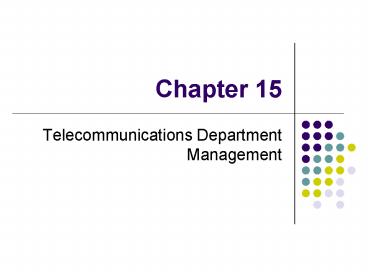Telecommunications Department Management - PowerPoint PPT Presentation
1 / 28
Title:
Telecommunications Department Management
Description:
Chapter 15 Telecommunications Department Management Need for Proactive Telecom Management 1. Telecom is a strategic asset Visible to company management 2. – PowerPoint PPT presentation
Number of Views:182
Avg rating:3.0/5.0
Title: Telecommunications Department Management
1
Chapter 15
- Telecommunications Department Management
2
Need for Proactive Telecom Management
- 1. Telecom is a strategic asset
- Visible to company management
- 2. Telecom industry competition creates choices
- Choose technology your company needs
- 3. Voice and data communication systems are
merging - Added complexity requires planning and control
- 4. Networks are evolving
- Require new outlook on management
- 5. More money is spent on telecom now
- Significant part of corporate budgets
3
Where the Telecom Department Fits in a Company
- Originally only voice communications
- Reliable - did not require too much maintenance
- Phone company provided expertise to find business
solutions - No special department for voice communication
responsibility - Data communications had fast growth
- Business solutions more diverse and complex than
for voice
4
Old-Style Organization
5
Where the Telecom Department Fits in a Company
- Companies starting to combine voice and data
system responsibility in one department - Main reasons for combining
- Efficiency
- Productivity
- Cost
- Main obstacle is political
- Voice and data in separate departments have
separate budgets, people, etc. - Department managers gain/lose power
6
Organization After Merging Voice and Data
Communications
7
Where the Telecom Department Fits in a Company
- Where should the telecommunications department
go? - Under Administration?
- Under Information Systems?
- Under some other department?
- In a department by itself?
8
Where the Telecom Department Fits in a Company
- Reasons to merge voice group with data group
under Information Systems department - IS department has a history of handling technical
problems - Easier for data communications people to learn
voice communications than the other way - Facilities needed for a PBX already exist in the
computer room - More efficient for companies to concentrate their
technical people responsible for communications
in one department - In large organizations Information Systems (or
similar) department is formed - Head of IS sometimes called Chief Information
Officer (CIO) - Sometimes CIO is a Vice President
- Examples Insurance, Banking, Airline industries
9
Separate Information Systems Dept.
10
Organization When Telecom is of Strategic
Importance
11
Telecom Department Functions
- Design and implement new facilities and services
- Network operations and technical support
- Administrative support
- Clerical support to telecom department
- Arrange for modifications
- User registration
- User training
12
Telecom Management Responsibilities
- Management functions
- Staffing
- Organization
- Planning
- Directing
- Controlling
- The need for good management skills has only
recently been recognized in many companies
13
Staffing
- Difficult function for managers
- Only recently have colleges introduced programs
educating people for telecom careers - Easier to obtain the right mix of skills in a
larger telecom department - Smaller department can augment skills with
consultants
14
Telecom Manager
- Skills
- Visualizes how telecom can solve business
problems - Communicates well
- Grasps technical subjects
- Credentials
- Good planner and decision maker
- College degree in management, telecom, or
engineering
15
Designers and Implementers
- Skills
- Good understanding of communication systems
- Creative
- Understand project management
- Good communications skills
- Credentials
- Usually have 4-year degree
16
Network Operations Staff
- Skills
- Service oriented
- Often interfaces with others
- Good communication skills
- Understand network hardware and software
- Credentials
- Usually 4 or 2-year degree
- Sometimes high school diploma
17
Technical Support Staff
- Skills
- Understand hardware and software
- Analytical problem solvers
- Credentials
- Usually a 4-year degree
18
Planning
- Essential to plan activities to best utilize
budget and personnel
19
Long Range Plan
- Put together by telecom manager
- Covers 3 to 5 year
20
Medium Range Plan
- More detailed than long range plan
- Show starting and ending times for all projects
- Gantt chart
21
Gantt Chart Used for Medium-Range Plan
22
Project Plan
- Detailed plan of a project
- Manhours, cost, people resources
23
More Detailed Project Plan Schedule
24
Controlling
- Financial controls
- Budget, costs, income
- Quality controls
- Should have standards of performance
- Need ways to assess how close you come to the
standards - Audits
- Need to periodically check how well you are doing
and review control procedures - Sometimes done by internal or external auditors
- Many times auditors have little or no telecom
experience - Management of audited department usually needs to
respond to the audit
25
Telecom Audit Checklist
26
Other Management Issues
- Selling the telecom department capabilities
- Some companies see the telecom department as
overhead - Focus on cost control, saving money
- Other companies see the value of the telecom
department as a profit center - Examples banks, airlines
- Transnational data flow
- Must be aware of laws and regulations affecting
data moving across international borders
27
Telecom Management Trends
- From Teleconnect Magazine in 1996
- 1. Large companies still separate voice and data
- 2. Telecom department staffing levels will tend
to be constant - Productivity needs to increase
- 3. Telephone call charges must be tracked
- Control costs
- 4. Outsourcing of service and maintenance
- 5. Managers dissatisfied with service from
vendors - 6. Video conferencing increasing
- Schools and hospitals lead the way
28
Telecom Management Trends 2003
- Teleconferencing with email and attachments.
- More merging of voice and data.
- Decrease in staffing levels with increase in
productivity. - Outsourcing is being replaced by increases in
productivity. - Increase in research investment.
- Flat fee pricing more prevalent.
- Managers working more closely with vendors as
partners.































